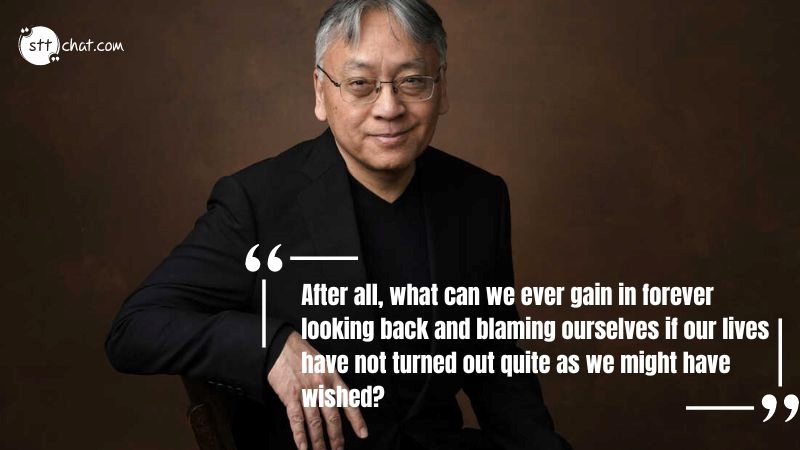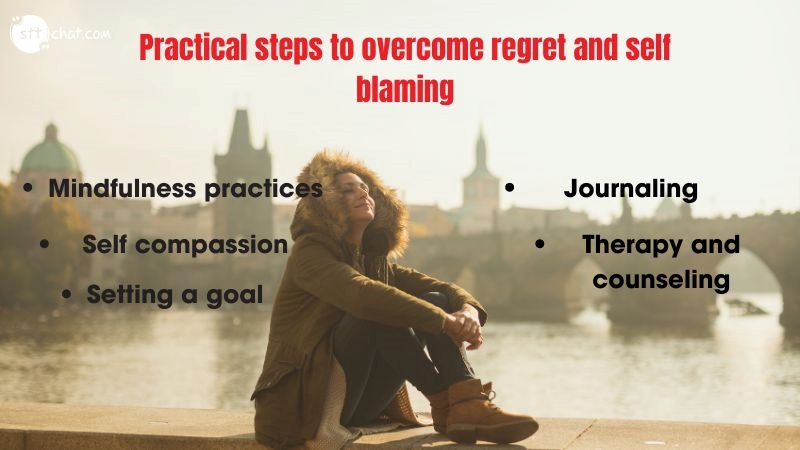After all, what can we ever gain in forever looking back and blaming ourselves if our lives have not turned out quite as we might have wished?
-Kazuo Ishiguro-
Kazuo Ishiguro, the Nobel Prize-winning author, has a knack for crafting profound statements that resonate with readers on a deep level. One such quote is, "After all, what can we ever gain in forever looking back and blaming ourselves if our lives have not turned out quite as we might have wished?" This statement encapsulates a significant philosophical inquiry into the nature of regret, self-reflection, and personal growth. In this blog post, we will delve into the meaning of this quote, its implications for our lives, and how it can guide us toward a more fulfilling future.
1. “After all, what can we ever gain in forever looking back and blaming ourselves if our lives have not turned out quite as we might have wished?” meaning
At its core, Ishiguro's quote challenges us to reconsider the value of dwelling on the past. The phrase "forever looking back" suggests a persistent focus on past events, while "blaming ourselves" points to a tendency to hold onto self-reproach and guilt. The quote asks a poignant question: What do we gain from this behavior? The implied answer is, very little. Instead of leading to constructive outcomes, this constant retrospection and self-blame can trap us in a cycle of regret and stagnation.

Looking back and blaming ourselves whether deserving
2.Giving up looking back a past moment
Regret is a common human experience. We all have moments in our lives that we wish had turned out differently. However, Ishiguro's quote prompts us to examine the utility of regret. While it can serve as a catalyst for learning and growth, excessive regret often leads to negative emotional states such as depression and anxiety. By continually focusing on what might have been, we lose sight of the present and the potential it holds for positive change.
3.Looking back and self blaming
Self-blame is another critical aspect of Ishiguro's quote. It is a form of self-directed negativity that can be incredibly damaging. When we blame ourselves for past mistakes or perceived failures, we reinforce a negative self-image. This not only hampers our self-esteem but also affects our ability to move forward and embrace new opportunities.

We tend to be self - blaming for ourselves and do not care our feelings - Source: Internet
Blaming ourselves incessantly can create a mental barrier that prevents personal development. It fosters a mindset where we believe we are unworthy of success or happiness, leading to a self-fulfilling prophecy of continuous dissatisfaction. Therefore, we need to prevent ourselves from looking back at a past moment which improve our quality of life's quality.
4.Shifting focus: From past to present
Ishiguro's quote implicitly encourages us to shift our focus from the past to the present and future. Instead of ruminating on what has gone wrong, we should channel our energy into what we can do now to improve our lives. This shift in perspective is crucial for personal growth and well-being.
Living in the present moment allows us to make the most of our current opportunities. It helps us appreciate the here and now, fostering a sense of gratitude and contentment. Moreover, by focusing on present actions, we can create a positive trajectory for the future, rather than being weighed down by past regrets.
5.Practical steps to overcome regret and self blame

05 steps to overcome regret and self - blaming
5.1. Mindfulness practices
Engage in mindfulness meditation to help anchor yourself in the present moment and reduce the tendency to ruminate on the past. Such as, you set a goal or crate a plan to do for your future. A small piece of work will help you forget the past moment that makes you remember.
5.2.Self compassion
Practice self-compassion by treating yourself with the same kindness and understanding that you would offer a friend. Acknowledge your mistakes without harsh judgment. The best way you can enjoy or live for the present moment that your coming up goal, your purpose, your future. You have no time to remember the mistake with harsh judgment.
5.3.Setting a goal
Focus on setting realistic and achievable goals that align with your values and aspirations. This helps shift your focus from past failures to future successes. However, you need to discipline yourself that ensure you have n time to remind your failure.
5.4.Therapy and counseling
Seeking professional help can provide you with tools and strategies to cope with intense feelings of regret and self-blame. You can find through the positive energy or the high energy will help you be deep into a circle of work and no time to remember anything that makes you in a bad mood.
5.5.Journaling
Writing about your experiences and emotions can help you process them more effectively. Reflect on what you've learned from past experiences and how you can apply those lessons moving forward. Expressing your feelings through dairy is one of the greatest ways to exit your mind on your failure.
Conclusion
Kazuo Ishiguro's quote serves as a powerful reminder of the futility of dwelling on the past and blaming ourselves for unmet expectations. While it is natural to experience regret and self-blame, allowing these emotions to dominate our lives can hinder our growth and happiness. By shifting our focus to the present and adopting practices that promote self-compassion and mindfulness, we can break free from the shackles of the past and pave the way for a brighter, more fulfilling future.
Embrace the wisdom in Ishiguro's words and let go of the past. Focus on what you can change today to create the life you desire. Remember, the power to transform your life lies in your hands, here and now.






